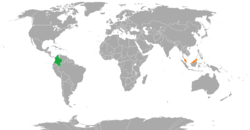Colombia–Malaysia relations: Difference between revisions
rmv section |
touch up |
||
| Line 13: | Line 13: | ||
==United Nations== |
==United Nations== |
||
On October 27, 1990, the two countries along with [[Cuba]] and [[Yemen]] voiced concerns over a [[UN resolution]] that would make Iraq responsible for financial repercussions relating to the [[Invasion of Kuwait]].<ref name="NYT">{{cite news|url=http://www.nytimes.com/1990/10/27/world/mideast-tensions-un-council-appears-close-accord-tougher-stance-against-iraq.html|title=MIDEAST TENSIONS; U.N. Council Appears Close to Accord on a Tougher Stance Against Iraq|last=Lewis|first=Paul|coauthors=Special To The New York Times|date=27 October 1990|work=The New York Times|page=5|accessdate=25 January 2013}}</ref> Eventually an agreement was made to increase pressure on President [[Saddam Hussein]] to withdraw from Kuwait and end the [[Gulf War]].<ref name="NYT" /> The war would eventually end on 28 February 1991 with the intervention of the [[Coalition of the Gulf War]]. Although Malaysia and Columbia supported the UN's authorized use of force against [[Iraq]], neither countries participated directly in the Coalition.<ref>{{cite news|url=http://newint.org/features/1992/10/05/profile/|title=Malaysia -- New Internationalist|last=Ehrlich|first=Richard S|date=October 1992|publisher=New Internationalist Magazine|pages=ISSUE 236|accessdate=25 January 2013}}</ref> |
On October 27, 1990, the two countries along with [[Cuba]] and [[Yemen]] voiced concerns over a [[UN resolution]] that would make Iraq responsible for financial repercussions relating to the [[Invasion of Kuwait]].<ref name="NYT">{{cite news|url=http://www.nytimes.com/1990/10/27/world/mideast-tensions-un-council-appears-close-accord-tougher-stance-against-iraq.html|title=MIDEAST TENSIONS; U.N. Council Appears Close to Accord on a Tougher Stance Against Iraq|last=Lewis|first=Paul|coauthors=Special To The New York Times|date=27 October 1990|work=The New York Times|page=5|accessdate=25 January 2013}}</ref> Eventually an agreement was made to increase pressure on President [[Saddam Hussein]] to withdraw from Kuwait and end the [[Gulf War]].<ref name="NYT" /> The war would eventually end on 28 February 1991 with the intervention of the [[Coalition of the Gulf War]]. Although Malaysia and Columbia supported the UN's authorized use of force against [[Iraq]], neither countries participated directly in the Coalition.<ref>{{cite news|url=http://newint.org/features/1992/10/05/profile/|title=Malaysia -- New Internationalist|last=Ehrlich|first=Richard S|date=October 1992|publisher=New Internationalist Magazine|pages=ISSUE 236|accessdate=25 January 2013}}</ref> |
||
In 2006, both countries applied to the [[United Nations Environmental Programme]] during the [[Montreal]] Protocol for International Strengthening (IS).<ref name="UNIS">{{cite web|url=http://www.multilateralfund.org/MeetingsandDocuments/currentmeeting/64/English/1/6419.pdf|title=UNDP’S WORK PROGRAMME AMENDMENTS FOR 2011|date=9 June 2011|publisher=[[United Nations Environment Programme]]|language=English|accessdate=25 January 2013}}</ref> The committee's reviewed their applications together and approved $275,000 in funding for both countries.<ref name="UNIS" /> |
|||
==References== |
==References== |
||
Revision as of 00:41, 25 January 2013
An editor has nominated this article for deletion. You are welcome to participate in the deletion discussion, which will decide whether or not to retain it. |
 | |
Colombia |
Malaysia |
|---|---|
Colombia–Malaysia relations refers to bilateral foreign relations between the countries of Colombia and Malaysia. Colombia maintains an Embassy in Kuala Lumpur, while the embassy of Malaysia in Lima, Peru is accredited to Colombia.[1]
Diplomatic relations between the two countries began on August 19, 1978. Both countries are members of the United Nations, Non-Aligned Movement and the Pacific Economic Cooperation Council in which Malaysia largely supported Colombia's acceptance in 1994.[1] The countries both belong to the Global System of Trade Preferences among Developing Countries which is a preferential trade agreement that was signed in 1989.[2]
Both countries agree on the importance of cooperating on issues such as the protection and sustainable use of natural resources, the fight against the world drug problem, and strengthening relations between the countries of the Pacific basin.[1]
United Nations
On October 27, 1990, the two countries along with Cuba and Yemen voiced concerns over a UN resolution that would make Iraq responsible for financial repercussions relating to the Invasion of Kuwait.[3] Eventually an agreement was made to increase pressure on President Saddam Hussein to withdraw from Kuwait and end the Gulf War.[3] The war would eventually end on 28 February 1991 with the intervention of the Coalition of the Gulf War. Although Malaysia and Columbia supported the UN's authorized use of force against Iraq, neither countries participated directly in the Coalition.[4]
In 2006, both countries applied to the United Nations Environmental Programme during the Montreal Protocol for International Strengthening (IS).[5] The committee's reviewed their applications together and approved $275,000 in funding for both countries.[5]
References
- ^ a b c "(Spanish) Relaciones bilaterales". Embassy of the Republic of Colombia, Kuala Lumpur, Malaysia. Retrieved 2012-12-08.
{{cite web}}: Italic or bold markup not allowed in:|publisher=(help) - ^ "World Regions and Trade Organizations". U.S. Department of Commerce. Retrieved 25 January 2013.
- ^ a b Lewis, Paul (27 October 1990). "MIDEAST TENSIONS; U.N. Council Appears Close to Accord on a Tougher Stance Against Iraq". The New York Times. p. 5. Retrieved 25 January 2013.
{{cite news}}: Unknown parameter|coauthors=ignored (|author=suggested) (help) - ^ Ehrlich, Richard S (October 1992). "Malaysia -- New Internationalist". New Internationalist Magazine. pp. ISSUE 236. Retrieved 25 January 2013.
- ^ a b "UNDP'S WORK PROGRAMME AMENDMENTS FOR 2011" (PDF). United Nations Environment Programme. 9 June 2011. Retrieved 25 January 2013.


